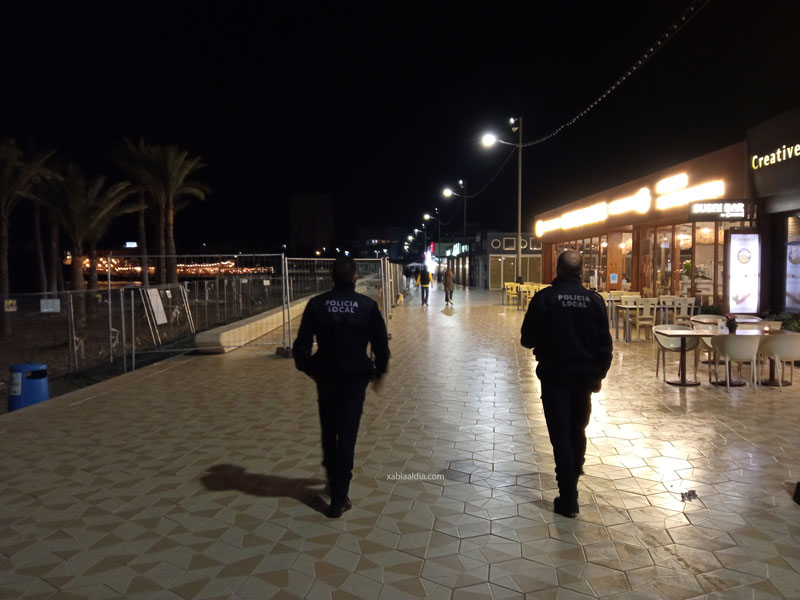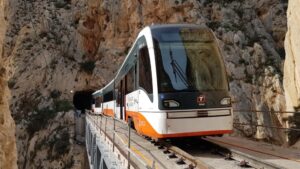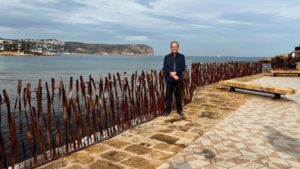Xàbia returns to night curfew from midnight Monday for 21 days until September 6th
The Court maintains that the restriction of night movement does not suspend the right to free movement but rather limits it.

Friday 13th August 2021 – PRESS RELEASE with Mike Smith
The Superior Court of Justice in the Comunidad Valenciana (TSJCV) has authorised the extension of the night curfew for selected municipalities in the region, including Xàbia, from midnight Monday 16th August until midnight Monday 6th September. Movement will be limited between 1.00am and 6.00am to only those tasks which are seen as essential, including travelling to and from work or visiting health centres.
A total of 68 municipalities in the region with a population greater than 5,000 that present a high risk of COVID-19 infection spread will be subject to the night curfew for 21 days, including six municipalities in the Marina Alta region: Calp, Dénia, Pedreguer, Pego, Teulada and Xàbia. This will come as some relief to many people in the latter, since the town has become a magnet for those escaping the curfew of the surrounding towns, travelling to the coast for illegal street parties – known as botellones – and other anti-social behaviour that has caused such misery for both residents and a beleaguered local police force.
In addition, social gatherings in homes and spaces for private use as well as spaces for public use, both indoors and outdoors, are limited to ten people, except if everyone lives together in the same household or the group consists of two nuclei of people who lives together in the same household.
In a statement, the TSJCV explained that it considered the adoption of the measures requested by the regional government are “still necessary” to maintain control and ensure compliance for all health protocols, with the purpose of limiting the so-called “botellones” and the gathering of people at night. In addition, it considers that the limitation of the number of people in family or social gatherings can help reduce the largest outbreaks of the infection, which affect not only young people but all members of the group (it noted that almost 89% of outbreaks can be sourced to family and social gatherings).
The court order also alluded to the spread of the Delta variant of COVID-19, the increase in hospitalizations and deaths, the growth in positive diagnostic tests, and the increased socialization and movement. It added that the most affected group are the youngest, and although the disease is usually mild and has fewer deaths, these infections still have an impact, especially on Primary Care. There is also the risk of a variant emerging that may affect the protection provided by vaccines and previous infection.
In terms of legality of a night curfew, considering the ruling of the Constitutional Court on July 14th that declared the national lockdown imposed by central government during the first state of alarm as unconstitutional, the TSJCV considers that a night curfew doesn’t impose a suspension of rights but rather limits freedom of movement for five hours during the night, determining that current legislation allows for a curfew “as long as it is justified”.
Night Curfew Exceptions
- To acquire medicines, health products and other basic necessities.
- To attend health centres, services and other similar establishments.
- To attend veterinary care centres in emergency situations.
- To fulfill work, professional, business, institutional or legal obligations.
- To return to the usual place of residence after carrying out some of the activities in this section.
- To assist and care for elderly, minors, dependents, people with disabilities or especially vulnerable people.
- To attend hunting activities linked to the control of the overabundance of game species that can cause damage to ecosystems, in the productive cycles of agriculture and livestock, and in road safety.
- Due to force majeure or situation of need.
- To carry out other activities of a similar nature, duly accredited.
- To refuel at gas stations or service stations, when necessary to carry out activities provided for in the preceding paragraphs.




